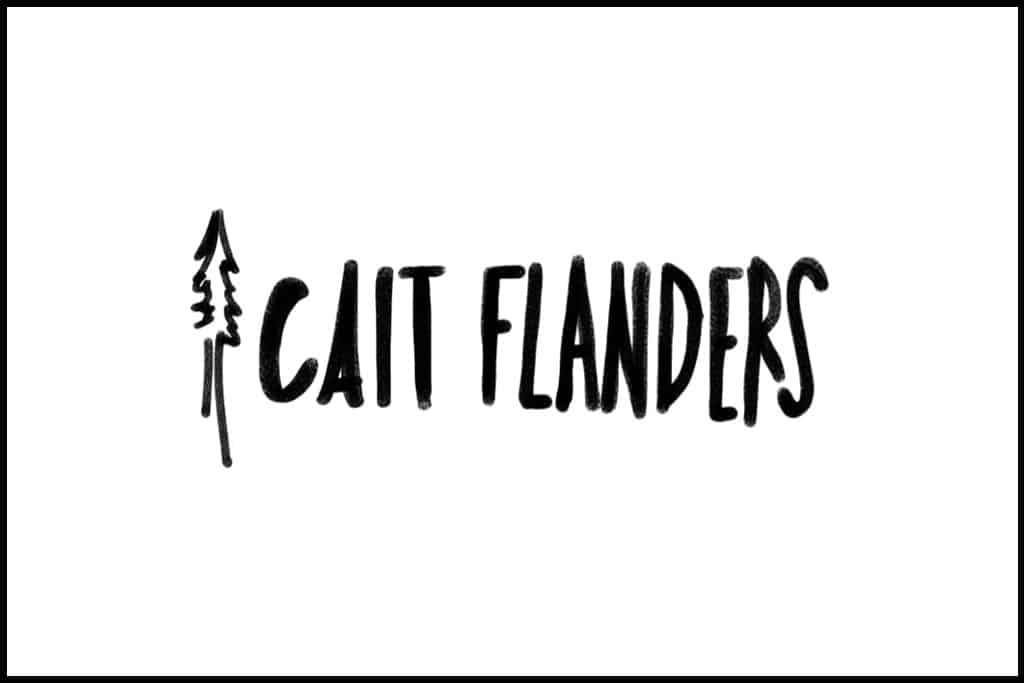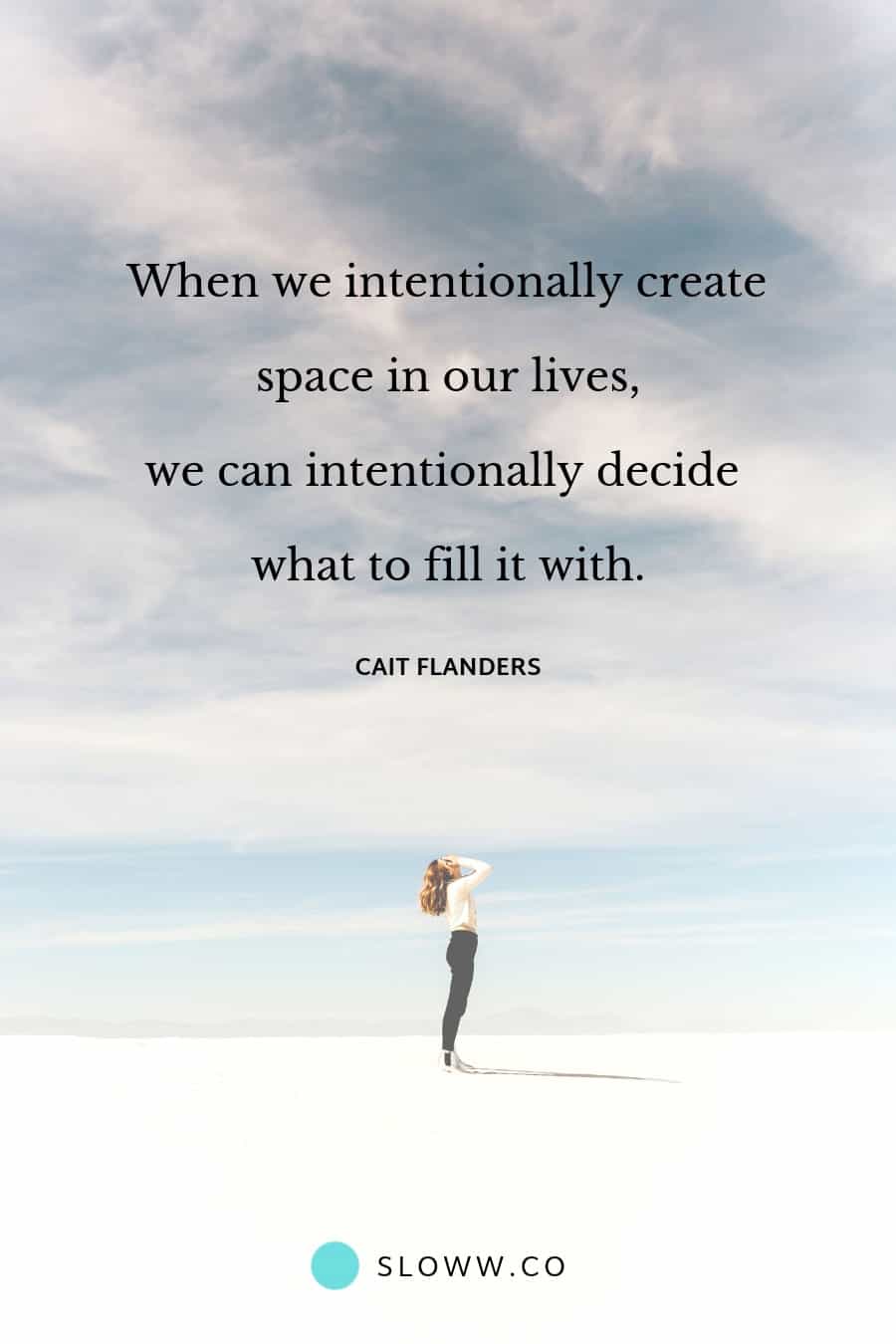
Cait Flanders is one of the top slow living and simple living voices online—I previously highlighted how she began her intentional living journey in this post: 11 Slow & Simple Living Leaders Share Their “Why”
If you aren’t familiar with Cait Flanders, she’s been blogging since 2011 and is the author of the Wall Street Journal best-selling book The Year of Less: How I Stopped Shopping, Gave Away My Belongings, and Discovered Life is Worth More Than Anything You Can Buy in a Store (Amazon).
How about a video introduction to Cait? Here you go. This is a podcast interview with Anthony Ongaro of Break the Twitch—it’s long, but you can skip through it to get a gist:
3 Intentional Living Learnings from Cait Flanders: Slow Living, Being a Mindful Consumer & Mindful Creation
If you’ve spent any time reading intentional living content, you’ve likely realized there are some different sub-genres and online communities. For instance, there’s a FIRE (Financial Independence Retire Early) community, a simple living community, a minimalism community, and many more—along with plenty of overlap between communities.
Each creator has a different voice and approach to their content. The thing I admire about Cait’s voice is that it’s probably the most authentic, real, and raw. She has a unique way of digging deep—and asking the tough questions—that few others possess.
So, when she wrote the post Why I’m Retiring from Personal Blogging, it really spoke to me as a newish creator. It was the most real thing I had read since Mad Fientist’s post Hierarchy of Financial Needs (and the Meaning of Life).
Here are some of the highlights from Cait’s final post:
I just want to be a human in this world.
Now, I want to show up for all of you and help the best way I can.
Now, I believe that the best thing I can do is continue to model what it means to live an intentional life…when we intentionally create space in our lives, we can intentionally decide what to fill it with.

Needless to say, her writing has been an inspiration to me—here are three things I’ve learned from her:
1. You can (and should) try applying “slow” to every aspect of your life
In Cait’s words:
When I slow down, I can dive deeper—and that’s how I prefer to live.
slow pace of life = create more
fast pace of life = create less
Slow living has branched into a number of slow sub-topics, including: slow fashion, slow travel, and many more.
Cait conducted a “year of slow living experiments” in 2017 that I included in my comprehensive list of simple living and slow living challenges.
Each month, she experimented with a different type of slow:
- Slow mornings
- Slow money
- Slow moving
- Slow breathing
- Slow technology
- Slow food
- Slow consumption
- 30 days in nature
- Slow work
- Slow travel, and
- Slow evenings
In the spirit of slow, try these one at a time. Some will work for you, and some may not. That’s perfectly fine because we’re all different, so naturally all types of slow will not work for everyone. Experiment with different ones to figure out what works best for you—the keyword here is try.
2. If you’re human and reading this, you are called to be a mindful consumer
In Cait’s words:
I’ve embraced the idea of being a mindful consumer. It means I use my mind + body to pay attention to what I’m consuming, why, and how it makes me feel.
I just want to say this: you don’t have to keep up with it all. It is exhausting and anxiety-inducing—and it is physically impossible.
You literally cannot read, watch and do everything. And also, remember that what consumes your mind controls your life and finances.
I’ve spent most of this year thinking about how we consume information, and believe more of us could stand to take a step back and look at the bigger picture.
Lots of good reminders in those quotes:
- You can’t do all the life hacks (and that’s OK).
- Our brains have mental bandwidth limits.
- Your beliefs determine your behaviors which determine what you become.
- When you begin intentional living, it’s not uncommon to reduce your spending by 20-25 percent naturally.
- You can literally think about the “bigger picture” by remembering the Earth overview effect—figuratively, I like to think about the “bigger picture” in terms of the long-term view of life (my own life as well as futurism). Check out the future of busyness, and humanity’s future evolution via consciousness and simplicity.
3. If you’re a creator and reading this, commit to being a mindful creator
In Cait’s words:
As a collective, we are beginning to realize how limited our time, energy, and attention are—and creators need to respect that.
What does this mean for creators? I obviously can’t predict the future, but I do think it’s time to start asking big questions and setting intentions for the work we do.
Always remember that people are human beings first, and the content you share has the power to shift the way they think/feel. Be helpful. Be hopeful. Create the content you would want to consume. And really think about the messaging you’re putting out into the world.
I’ve found myself experiencing a growing frustration with some content in the minimalism/simple living space. In short: the solutions we are offering are way too simple. We can’t keep telling people that simplifying is going to solve all of their problems, and life will be filled with rainbows and unicorns after that. The real work comes next and it is hard. Let’s have more conversations about that.
In regards to having more conversations about simple living being hard work, I wholeheartedly agree. So much so, that this is one of my favorite quotes:
Simplicity is an advanced course. — Sri Chinmoy
And, how about life after you are already on board with simple living? When Cait says, “The real work comes next and it is hard,” I believe she’s referring to creating your own life purpose and meaning. She’s right. This is incredibly hard work. But, I’m committed to helping you find and create your own life purpose. I don’t think it’s a coincidence that one of the top posts on this site is about my existential crisis.
To her point about “asking big questions,” I like to think I do this (if anything, I may be guilty of asking them too often). And, I do create the content that I want to consume—similar to how Maria Popova of the well-known blog Brain Pickings describes her process and writing:
I read. And I write. In that order. And in between I do some thinking. And I think about how to live a meaningful life basically.
A record of my own becoming as a person.
An inventory on the meaningful life.
But, it’s been awhile since I’ve taken a true step back to take an honest look at everything I’ve created to date.
This post is #114 on the blog. At the end of last year, I wrote a short summary of everything I learned in the first 100 posts.
Another thing I did was I went through each post and thought about the concepts and practices that are tougher for me personally—the things I’ve preached in writing but still need to actively practice in life:
- I have a seemingly insatiable curiosity, which is a blessing and a curse. It’s tough for me to turn my brain off. Still need to work on “just-in-time learning” vs. “always-on learning.”
- I don’t get outside nearly enough. However, we are currently in the process of moving from the Midwest to Northern California, so I anticipate much more forest bathing in the near future. At the same time, this move is the opposite of geographic arbitrage.
- Eckhart Tolle says the three aspects of enlightened living are non-resistance, non-judgment, and non-attachment. I actually started tracking these three things on a daily basis. Turns out I’m best at non-attachment, followed by non-resistance. But, non-judgment is hard hard hard for me. Speaking of Eckart Tolle, living in the present moment will be a lifetime of practice to overcome the unconscious default setting of our minds.
- I still believe the Ikarians, from one of the Blue Zones, are the most sane people on the planet. The next big thing I want to incorporate from them is their diet. Speaking of eating, I do need to be more mindful at mealtime.
- Meditation is something I need to experiment with more. I have a friend who is into transcendental meditation and recommended it to me.
- Effective altruism is an incredible concept and an area I’d like to spend more time.
Cait’s point about always remembering that “people are human beings first” is something I think about daily. I even just rewrote my About page to focus more on that. Sloww is about more than slow living—I believe all the best things in life begin by slowing down. It’s about the modern art of living—why and how to live.
Some concepts and practices are easier than others. Some things may come naturally to you that are hard for me—and vice versa. Again, the keyword is try.
I’m not a professional—or even trained—writer. I’m an ex-marketer, so that’s the unique perspective that I’m able to provide in my writing. I’m still figuring out my voice, so for those of you along this journey in my early days, thank you for bearing with me while I figure things out.
I’d like to use the comments on this post as an open forum and would love to hear from you. What types of content have resonated with you so far? What do you want more of? Any constructive feedback, let me know. Thank you, as always, for taking the time to read. Time is life, after all.
I’ll end with this from Cait—she’s working towards “actively creating the life I wanted, rather than passively consuming the one I thought I should have.”
Reminds me of this final quote I’ll leave you with to ponder:
We can all agree that the unexamined life is not worth living…but if all you’re doing is examining, you’re not living. — Adam Leipzig
Here’s to examining and living.




